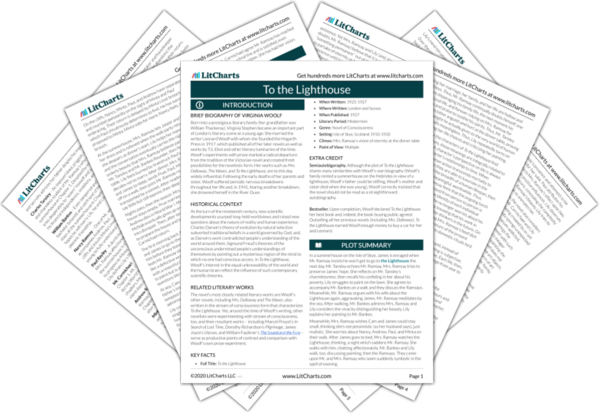Summary
Analysis
Entering the sitting room in which Mr. Ramsay sits reading, Mrs. Ramsay feels “she had to come here to get something she wanted.” What she wants has to do with sitting in her chair by her lamp but entails something more, too, which she cannot put her finger on.
Again, Mrs. Ramsay feels inarticulately pulled towards the calm, domestic security of her marriage and towards the space in which she can retreat into interior reflection in peace.
Themes
Quiz
Test Yourself
Mrs. Ramsay observes that Mr. Ramsay is absorbed reading a book by Sir Walter Scott, which she knows he has chosen because Mr. Tansley said at dinner that no one read Scott any more. She worries briefly about Mr. Ramsay’s anxiety about himself, but pushes the worries aside as meaningless. She has faith in him.
Mr. Ramsay’s interior anxieties are, as usual, starkly evident to Mrs. Ramsey.
Themes
Quiz
Test Yourself
Mrs. Ramsay sits knitting and feels herself “sinking deeper” towards something she wanted, still not knowing what it is. Words from the poem Mr. Ramsay had recited at dinner “begin washing from side to side of her mind rhythmically” setting off small lights in her mind that seem to “[leave] their perches…to fly across and across.” She murmurs the words of the poem as she reaches for a book to read: “And all the lives we ever lived / And all the lives to be, / Are full of trees and changing leaves.”
Mrs. Ramsay’s interior is compared to a body of water that she sinks into and that the words of a poem wash back and forth across like waves. Though she cannot articulate her desire, she feels it is connected to the resonance of the poem. The lines she murmurs comment on the constant change and ultimate ephemerality of human life.
Themes
Literary Devices
Quiz
Test Yourself
Mrs. Ramsay begins reading feeling she is “swinging herself” from line to line. Mr. Ramsay reads Scott with obvious relish, “fortified” and freed of all the nagging worries that had built up during dinner. Now he feels “it didn’t matter a damn who reached Z,” for someone would even if he didn’t. Finishing his chapter, he looks up to watch Mrs. Ramsay reading peacefully. She is absorbed in “climbing up those branches” of the lines, grasping flowers, ascending to “the summit” where she found “beautiful and reasonable, clear and complete, the essence sucked out of life and held rounded there—the sonnet.”
Both Mr. and Mrs. Ramsay are invigorated by their reading and feel literature is integrally related to the essential meanings of life itself. Sir Walter Scott’s prose lets Mr. Ramsay take comfort in and feel a part of a greater human project than himself and stop worrying so much about his own achievement. Though a poem’s lines proceed in downward succession, Mrs. Ramsay compares the to the branches of a tree up which one climbs for the breathtaking, beautiful view at the top.
Themes
Quiz
Test Yourself
Get the entire To the Lighthouse LitChart as a printable PDF.

Mrs. Ramsay puts down her book and searches for things to say to Mr. Ramsay. They are both still dreamy, half-preoccupied by what they’ve been reading. She tells him Paul and Minta are engaged and he says he’d guessed it. She jokes, recounting her silly thought about Paul’s gold watch and leather bag. Mentioning the engagement draws Mrs. Ramsay’s mind to wonder “what was the value, the meaning” of marriage. She aches for Mr. Ramsay to say something, and feels the first tug towards despair. When he says she won’t finish knitting her stocking tonight, Mrs. Ramsay is grateful for “the asperity in his voice reproving her” and agrees with him. She thinks “the marriage will turn out all right.”
Mr. and Mrs. Ramsay speak to one another more for the comfort of hearing one another’s voices than for the necessity of conveying information. In this respect, their words are like the words of the poem Mr. Ramsay recited at dinner that Mrs. Ramsay felt resonate with her interior thought without fully distinguishing their specific meaning.
Themes
Quiz
Test Yourself
Mrs. Ramsay feels from Mr. Ramsay’s look that he wants her to tell him she loves him. Yet “she never could,” since talking does not come as easily to her, she thinks, as it does to him. In the past he’s called her “heartless” for never articulating her love aloud. Mrs. Ramsay gets up to look at the Lighthouse through the window and feels the admiration for her beauty in Mr. Ramsay’s gaze and feels him still wishing she would pronounce her love. She turns to look at him and smiles and knows he knows how much she loves him. She is full of joy. She says that he’s “right, it’s going to be wet tomorrow.” She smiles knowing he feels her love, “for she had triumphed again.”
The novel has just showcased a several-hour-long dinner party during which Mrs. Ramsay proved herself a prodigious talker, but that was small talk, social patter, and the kind of speech Mr. Ramsay craves is intimate, direct statement. Still, Mrs. Ramsay is more comfortable with the kind of speech that conveys feeling indirectly, as her earlier words with Mr. Ramsay conveyed their affection for one another without explicitly saying so. In the end, Mrs. Ramsay is again able to convey all she wants to without saying it outright.
Themes
Quiz
Test Yourself












